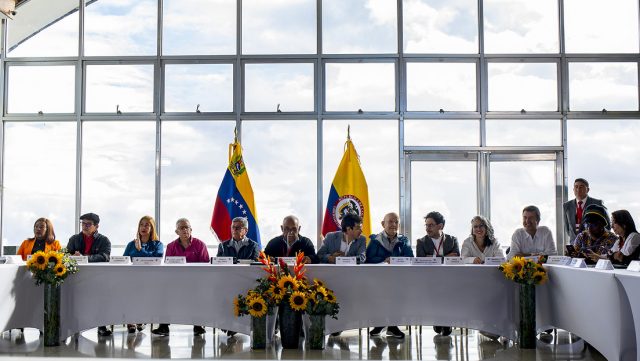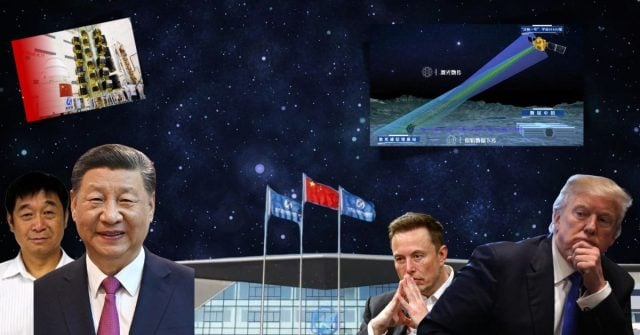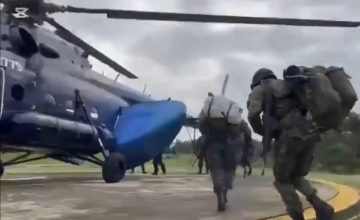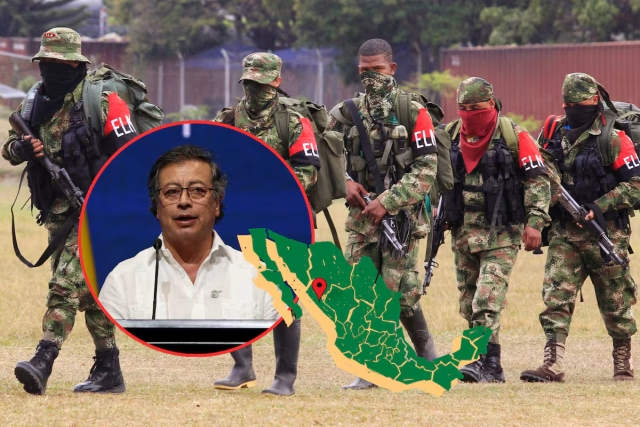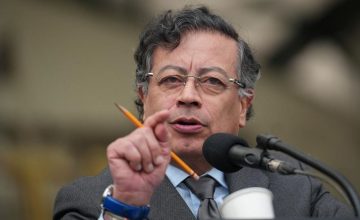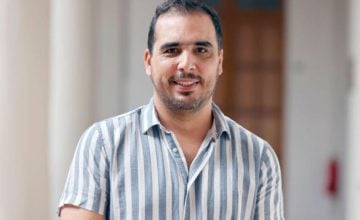The resumption of the negotiations between the Government of Colombia and the guerrilla of the National Liberation Army (ELN), in Caracas, marks a new milestone in the long history of failed dialogues, which has been going on for more than 30 years.
«We hope not to fail», said guerrilla leader Pablo Beltrán. They were not gratuitous words, since it is not the first time that a peace agreement with the ELN has been attempted, but until now various obstacles have prevented a satisfactory resolution for the parties, reported RT.
Changes in government, violent actions by the guerrillas, political pressure and the actions of paramilitaries are just some of the obstacles that have accumulated throughout history to prevent effective pacification with an insurgent group that took up arms on the 4th of July 1964.First attempt with the ELN
It was in 1991, during the administration of the then president of Colombia, César Gaviria, when the first ‘bridges’ of dialogue with the insurgent group were opened. The initiative arose at a time when the country was suffering from a bloody wave of social and political violence, fueled by the guerrillas and drug trafficking.
Negotiations began in Caracas, but later moved to Mexico. The Simón Bolívar Guerrilla Coordinator, created in 1988, participated with members of the extinct Revolutionary Armed Forces of Colombia (FARC), the ELN and the so-called Popular Liberation Army (EPL) in the table.
However, the dialogues were cut short the following year by the death of former Minister Argelino Durán Quintero, while he was kidnapped by the EPL.Failures and unsuccessful attempts
Under the government of Andrés Pastrana, the effort to achieve pacification was resumed. At the beginning of 1998, the path chosen was the Viana pre-agreement, signed by government spokesmen and ELN leaders in Madrid.
That pact established a schedule of preparatory meetings, but the content of the agreement was leaked to the press and then, the top commander of the ELN, the Spanish priest Manuel Pérez Martínez, was killed. Both events sealed the deadlock in the talks.
Months later, the so-called Puerta del Cielo agreement was signed. During this process, representatives of civil society and the National Peace Committee met with the guerrilla leaders of the ELN, Pablo Beltrán and Milton Hernández, in Germany, for the formation of a committee that would explore the possibility of the guerrillas stopping the practice of kidnappings and attacks on oil pipelines.
That same year, the Pastrana government recognized the political nature of the ELN and gave the green light to preparations for holding a National Convention, with the participation of representatives of the civil society.
In 1999, both parties raised the possibility of opening an area in the south of the Colombian state of Bolívar for holding talks. The round-trip talks took place in Caracas, but in April, the ELN hijacked a passenger plane and, a month later, illegally detained 143 people in a church, prompting the government to halt negotiations.
At the end of the year, contacts were resumed in Cuba, while part of society –and paramilitary leaders– pressed to boycott the meetings in the demilitarized zone in southern Bolívar in Colombia.
In 2000, the creation of the group of friendly countries and facilitators, made up of Cuba, France, Spain, Norway and Switzerland, was part of the international effort to give impetus to the new phase. However, the kidnapping of 18 people by the ELN, three of whom died, once again clouded the rapprochement. The following October, both parties put a ‘crop substitution’ agreement on the table.
The release of the detainees gave way to a regulation on the operation of the meeting zone in southern Bolívar, which collided with the fierce opposition of Carlos Castaño, the commander of the so-called United Self-Defense Forces of Colombia (AUC), a bloody paramilitary group that became a key player in the armed conflict.
The following year, when it seemed that progress was possible, the ELN alleged breach of the agreements by the Government, in view of the presence of the AUC in the demilitarized zone, as well as of the FARC. In the opinion of that guerrilla organization, there were no conditions for dialogue. In September 2001, despite the efforts, the negotiations were terminated.Uribe, the paramilitaries and the pressures against the ELN
In the government of Álvaro Uribe (2002-2010) there were approaches with the ELN, the FARC and the AUC to try to reach a ceasefire agreement.
In the case of the ELN, exploratory talks were held between the guerrillas and the Uribista administration. Between 2005 and 2007, both parties held talks in Cuba and Venezuela, with the support of Hugo Chávez and the governments of Switzerland, Spain and Norway.
The process advanced with a basic agreement that included a ceasefire and of the hostilities, the national suspension of detentions, and the release of detainees by the ELN. However, the immovable position of the Uribe government, which denied the existence of a large-scale armed conflict, was one of the factors that threw the preliminary talks overboard, added to the negotiations initiated by the government with the AUC paramilitaries. .A half-hearted approach
With the Government of Juan Manuel Santos (2010-2018) the exploratory dialogues were resumed and an agenda was established for the installation of a public dialogue table. The process was initially halted because the ELN did not accept the requirement to hand over the hostages in its possession.
On February 7, 2017, the talks table was finally installed in Quito, after the release of former congressman Odín Sánchez Montes de Oca. However, on January 28, 2018, Santos suspended the cycle of peace talks due to a series of attacks attributable to the ELN on the Atlantic Coast, which left six police officers and two civilians dead.
Subsequently, the government of President Iván Duque (2018-2022) was not a promoter of the dialogues with the ELN, although any hint of starting negotiations was discarded on January 17, 2019, after the attack perpetrated by the guerrilla group against the School of Cadets Francisco de Paula Santander, in Bogotá, which left 23 dead and a hundred wounded.And now that?
After more than three decades of failed negotiations, the government of Gustavo Petro hopes to satisfactorily conclude the dialogues with the ELN leaders to find a way out of the violence that Colombia is experiencing.
The process, which formally resumed this week, almost coincides with the date of the signing of the agreement signed between the Santos government and the FARC guerrillas, in 2016.
For now, the ELN’s attitude is optimistic. According to Beltrán, in an interview published on Thursday by El País, this new process is «different» from the previous ones because the government of Gustavo Petro «has publicly stated that it is going to work to carry out a true and definitive peace».
Petro’s commitment to what he has called «total peace» is a meeting point with the current guerrilla leaders. Meanwhile, on the table, there are six main points that will enter into the negotiation:
– Participation of society in the construction of peace
– Democracy for peace
– Transformations for peace
– Victims
– End of the armed conflict
– Implementation
On this occasion, the agenda recognizes the progress achieved in previous negotiations, the guarantor countries are familiar faces for the parties and we can add the experience of a peace agreement reached with the FARC. But the substantial difference, at least on the political level, is that the direct promoter of the agreement is Petro, the first left-wing president in the history of Colombia and a man who was a member of the first guerrilla group to put down his gun to believe in the vote, in 1990.
The duration of the negotiations is still unknown. However, Beltrán is clear that the seed for the agreement has fallen on fertile ground. “We hope that we will take advantage of the ‘quarter of an hour’ (expression that means the time that something, in this case a government lasts) that the government of President Petro means so as to advance as far as possible. Of course, we sit here (in the dialogue table) and we must build on the progress that already exists, and not start from scratch», he told El País.
